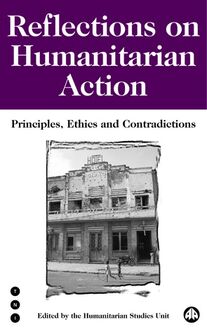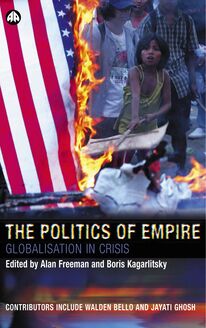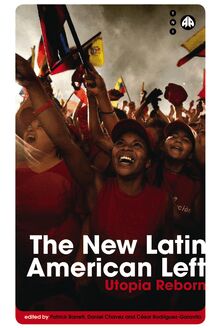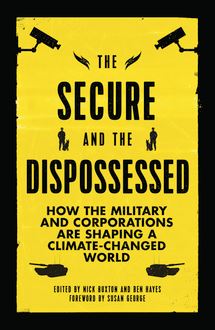-
 Univers
Univers
-
 Ebooks
Ebooks
-
 Livres audio
Livres audio
-
 Presse
Presse
-
 Podcasts
Podcasts
-
 BD
BD
-
 Documents
Documents
-
- Cours
- Révisions
- Ressources pédagogiques
- Sciences de l’éducation
- Manuels scolaires
- Langues
- Travaux de classe
- Annales de BEP
- Etudes supérieures
- Maternelle et primaire
- Fiches de lecture
- Orientation scolaire
- Méthodologie
- Corrigés de devoir
- Annales d’examens et concours
- Annales du bac
- Annales du brevet
- Rapports de stage
La lecture à portée de main
209 pages
English
Découvre YouScribe en t'inscrivant gratuitement
Je m'inscrisDécouvre YouScribe en t'inscrivant gratuitement
Je m'inscris
Obtenez un accès à la bibliothèque pour le consulter en ligne
En savoir plus
En savoir plus
209 pages
English
Obtenez un accès à la bibliothèque pour le consulter en ligne
En savoir plus
En savoir plus

Description
Humanitarian action has become a subject for serious debate in light of recent conflicts across the globe. The debacle in Somalia, the policy of intervention in Bosnia, and domestic conflicts in the West over intervention in Kosovo have given rise to many complex questions surrounding humanitarian action. The contributors to this volume provide a systematic overview of the issues involved from a wide range of viewpoints.
The book examines the central problems of humanitarian action: the judicial question and the right to humanitarian assistance; the ethical framework of humanitarian action; the challenge of coordination of all the actors involved in humanitarian action; the recipients in the aid chain; the link between aid, development and emergency action; the role of the media; and a practical evaluation of Operation Lifeline Sudan.
Abbreviations and Acronyms
Introduction
Humanitarian Studies Unit
1. The Role of Humanitarian Issues in International Politics in the 1990s
Adam Roberts
2. The Right to Humanitarian Aid: Basis and Limitations
Joana Abrisketa
3. The Ethical Framework of Humanitarian Action
Xabier Etxeberría
4. The Complex Nature of Actors in Humanitarian Action and the Challenge of Co-Ordination
Francisco Rey
5. Subalterns on the Aid Chain
David Sogge
6. Relief, Development and Humanitarian Intervention
Joanne Raisin and Alexander Ramsbotham
7. The Media and the Humanitarian Spectacle
Mariano Aguirre
8. Chronicle of Ajiep, Bahr el Ghazal, Sudan, 1998
Médecins Sans Frontières
Contributors
Index
The book examines the central problems of humanitarian action: the judicial question and the right to humanitarian assistance; the ethical framework of humanitarian action; the challenge of coordination of all the actors involved in humanitarian action; the recipients in the aid chain; the link between aid, development and emergency action; the role of the media; and a practical evaluation of Operation Lifeline Sudan.
Abbreviations and Acronyms
Introduction
Humanitarian Studies Unit
1. The Role of Humanitarian Issues in International Politics in the 1990s
Adam Roberts
2. The Right to Humanitarian Aid: Basis and Limitations
Joana Abrisketa
3. The Ethical Framework of Humanitarian Action
Xabier Etxeberría
4. The Complex Nature of Actors in Humanitarian Action and the Challenge of Co-Ordination
Francisco Rey
5. Subalterns on the Aid Chain
David Sogge
6. Relief, Development and Humanitarian Intervention
Joanne Raisin and Alexander Ramsbotham
7. The Media and the Humanitarian Spectacle
Mariano Aguirre
8. Chronicle of Ajiep, Bahr el Ghazal, Sudan, 1998
Médecins Sans Frontières
Contributors
Index
Sujets
Informations
| Publié par | Pluto Press |
| Date de parution | 20 avril 2001 |
| Nombre de lectures | 0 |
| EAN13 | 9781849641098 |
| Langue | English |
| Poids de l'ouvrage | 1 Mo |
Informations légales : prix de location à la page 0,6250€. Cette information est donnée uniquement à titre indicatif conformément à la législation en vigueur.
Extrait
Reflections on Humanitarian Action
Principles, Ethics and Contradictions
Edited by the Humanitarian Studies Unit
P Pluto Press LONDON • STERLING, VIRGINIA in association with Transnational Institute(TNI) The Humanitarian Studies Unit
ECHO(European Commission Humanitarian Office)
First published 2001 by Pluto Press 345 Archway Road, London N6 5AA and 22883 Quicksilver Drive, Sterling, VA 20166–2012, USA
www.plutobooks.com
Copyright © The Humanitarian Studies Unit (Unidad de Estudios Humanitarios) 2001. Chapter 1 Copyright © Adam Roberts, 1999, 2000. English translations copyright © Stephen Mackey and Allison M. Rohe
The right of the individual contributors to be identified as the authors of this work has been asserted by them in accordance with the Copyright, Designs and Patents Act 1988.
British Library Cataloguing in Publication Data A catalogue record for this book is available from the British Library
Library of Congress Cataloging in Publication Data applied for
ISBN 0 7453 1727 8 hardback ISBN 0 7453 1726 X paperback
10 09 08 07 06 05 04 03 02 01 10 9 8 7 6 5 4 3 2 1
Designed and produced for Pluto Press by Chase Publishing Services, Fortescue, Sidmouth, EX10 9QG Typeset from disk by Stanford DTP Services, Northampton Printed in the European Union by TJ International, Padstow, England
Contents
List of Abbreviations and Acronyms About the Transnational Institute
Introduction The Humanitarian Studies Unit
1. Humanitarian Principles in International Politics in the 1990s Adam Roberts
2. The Right to Humanitarian Aid: Basis and Limitations Joana Abrisketa
3. The Ethical Framework of Humanitarian Action Xabier Etxeberría
4. The Complex Nature of Actors in Humanitarian Action and the Challenge of Coordination Francisco Rey
5. Subalterns on the Aid Chain David Sogge
6. Relief, Development and Humanitarian Intervention Joanne Raisin and Alexander Ramsbotham
7. The Media and the Humanitarian Spectacle Mariano Aguirre
8. Chronicle of Ajiep, Bahr el Ghazal, Sudan, 1998 Médecins Sans Frontières
List of Contributors Index
vi viii
1
23
55
78
99
120
142
157
177
193 194
List of Abbreviations and Acronyms
ACP CAP CIP
CPE CRED CSFP DAC DHA EC ECHO EMOP EU FAO
FAR FRRA G-8
IASC ICC ICRC IMRCRC
INGO MSF Spain MSF NATO NGDO NGO OAF OCHA
Africa, Caribbean and Pacific Consolidated Appeals Process Centro de Investigación para la Paz (Centre for Peace Research) Complex Political Emergency Centre for Research into the Epidemiology of Disasters Common Security and Foreign Policy Development Assistance Committee Department of Humanitarian Affairs (United Nations) European Community European Commission Humanitarian Office Emergency Operations Programme (of WFP) European Union Food and Agriculture Organisation of the United Nations Rwandan Armed Forces Fashoda Relief and Rehabilitation Agency Canada, France, Germany, Italy, Japan, Russia, United Kingdom and USA (the world’s seven richest countries plus Russia) Inter-Agency Standing Committee International Criminal Court International Committee of the Red Cross International Movement of the Red Cross and the Red Crescent International Non-Governmental Organisation Spanish section of Médecins Sans Frontières Médecins Sans Frontières North Atlantic Treaty Organisation Non-Governmental Development Organisation Non-Governmental Organisation Operation Allied Force (NATO air campaign in Kosovo) Office for the Coordination of Humanitarian Affairs (United Nations)
vi
OECD
OFDA OLS OSCE P5
PDD RASS RPF SC SPLA SPLM SRRA
SSIM The Code
UDA
UN UNAMIR UNDP UNDRO UNESCO
UNHCR UNICEF
UNITAF
UNOSOM II
UNPROFOR UNUMOZ WFP WHO
Abbreviations and Acronyms
vii
Organisation for Economic Cooperation and Development Office for Disaster Assistance [United States] Operation Lifeline Sudan Organisation on Security and Cooperation in Europe Permanent Five countries of the Security Council – United States, China, Russia, France, United Kingdom Presidential Decision Directive Relief Association of Southern Sudan Rwandan Patriotic Front United Nations Security Council Sudan People’s Liberation Army Sudan People’s Liberation Movement Sudan Relief and Rehabilitation Agency (humanitarian branch of the SPLM) South Sudan Independence Movement The Code of Conduct Relating to Disaster Relief for the IMRCRC and NGOs in 1994 Urgence Développement Alimentaire (MSF’s food and relief agency satellite) United Nations United Nations Assistance Mission for Rwanda United Nations Development Programme United Nations Disaster Relief Office United Nations Educational, Scientific and Cultural Organisation United Nations High Commissioner for Refugees United Nations International Children’s Endowment Fund United Nations International Task Force (Unified Task Force) United Nations Operation in Somalia (second operation) United Nations Protection Force United Nations Operation in Mozambique World Food Programme World Health Organisation
About the Transnational Institute
The Transnational Institute was founded in 1974 as a worldwide fellowship of committed scholars-activists. It was one of the first research institutes established to be transnational in name, composition, orientation and focus. In the spirit of public scholarship, and aligned to no political party, TNI seeks to create and promote international cooperation in analysing and finding possible solutions to such global problems as militarism and conflict, poverty and marginalisation, social injustice and environmental degradation. Since its inception, hundreds of progressive scholars and activists have been involved in TNI projects. This extensive international network is mobilised to find the most appropriate people to design and participate in study groups, international conferences, and the production and dissemination of research results. This generally takes the form of specifically targeted working and policy papers, as well as easy-to-read books, often translated into a number of languages. At the heart of TNI is the committed core of current fellows and advisers. They include journalists, independent researchers and senior scholars from similar institutes in Africa, Latin America, Eastern and Western Europe, Scandinavia and the United States.
viii
Introduction The Humanitarian Studies Unit
This book is the product of a joint endeavour between an academic institution, a research centre focused on the study of conflicts and a humanitarian non-governmental organisation (NGO). In 1997 the Pedro Arrupe Institute of Human Rights of the University of Deusto, the Centre for Peace Research (CIP) of the charityFundación Hogar del Empleado, and the Spanish section of Médecins Sans Frontières decided to undertake a project that would combine and analyse the views and experiences of each of the three institutions (although opinions expressed are not necessarily those of the organisations). The objective was to analyse humanitarian action over the course of the 1990s in order to highlight its main achievements and determine the possible challenges that may need to be confronted during the coming years. Since the end of the Cold War, states, multilateral organisations and NGOs have taken part in a variety of different humanitarian missions following natural disasters (although in many cases a lack of planning or environmental abuses have exacerbated the effects of natural phenomena) or economic, social and political conflicts (which in some cases have led to wars of varying intensity). These situations cause local economies to break down, the collapse of state structures (which for the most part are already weak and often corrupt), famines and massive displacements of people within the borders of their countries and/or beyond. Almost all these crises occur within states that are defined by the United Nations (UN) as weak or failed. A characteristic of modern-day wars (that is, wars since the end of the Cold War) is that they are prone to break out within failed states rather than between individual states. The internal structural breakdown of weak societies exacerbates ethnic, religious and national differences. Despite their domestic nature, as demonstrated in Rwanda, Burundi and the Democratic Republic of Congo, these conflicts impact powerfully on their regions. All three of these failed states are experiencing continuing violence which, with the involvement of countries such as Angola, Uganda and Zimbabwe,
1
2
Reflections on Humanitarian Action
links them to other crises in sub-Saharan Africa and have led to South Africa’s new role as mediator in the region. Whilst the end of the nuclear power struggle between the Cold War political blocs was a cause for celebration, the conflicts in the peripheral zones of the international system have attracted the attention of various states, the United Nations, multilateral regional organisations and the media. Similarly, European and North American societies, and those of some other countries, have seen the emergence of a growing moral preoccupation with ‘the others’; that is to say, those who are geographically and culturally distant, but who occupy our thoughts because we feel an obligation to help them. From the end of the 1980s and into the early 1990s humanitarian action took on diverse characteristics. On the one hand, it maintained the principles and practices of the nineteenth century when the Red Cross was founded; on the other, it had to adapt itself quickly to the demands of new challenges – for example:
• •
•
•
internal wars; the international legal debate over humanitarian intervention and whether protecting human rights supersedes the principle of sovereignty; the role of the media in the creation of a global moral conscience towards victims; the redefinition of national armed forces involved in humanitarian missions and the demands of a range of forums (including the UN) that states (particularly members of the UN Security Council) should cede political, economic and military power to the UN Secretary-General for peacekeeping missions, to prevent conflict or to maintain or impose peace.
Experience in Somalia, Bosnia, Cambodia, Sudan and Haiti has demonstrated to all involved that the problems of future humanitarian action will not be easily resolved. Although the popular conception of humanitarian action is the exercise of one party giving and another receiving, the reality is much more complex. The relationship between the commanders of the national armies that contribute forces and the United Nations proves to be seriously fractious, as Somalia and Bosnia showed. Elsewhere, humanitarian NGOs have found that the exercise of their moral command does not always match the complexity of the situation. They have had to examine the way in which their actions have not only sometimes proved unsuccessful, but how they have, on occasion, produced the opposite effect or have unwittingly
Introduction
3
prolonged conflicts. Moreover, the 1990s came to an end with a large question mark over the relationship between the power that states and NGOs have to intervene globally. As the extent to which states will continue to apply humanitarian principles selectively is open to question, the tasks that they are unwilling to risk, whether politically or militarily, are left to the NGOs. These issues, among others, are examined by the contributors to this book. Their proponents consider humanitarian action an essential part of the global situation due to the impact of the structural crises in failed states, the weakness of multilateral institutions and the increasing moral response of world society. Similarly, they believe that the need for humanitarian action and its moral legitimacy does not exempt it from critical reflection and analysis. These evaluations may help humanitarian action become more efficient in assisting victims in both the short and medium term. Moreover, they may help to design policies in the long term that will modify the structural roots of the problems that cause the crises which can affect hundreds of thousands of people. We consider that the link between humanitarian action and human rights, democracy, justice, the balance between the environment and production and economic systems that allow, stimulate and protect the free access to opportunities and to people’s needs is critical.
HUMANITARIAN DEBATES IN THE INTERNATIONAL SYSTEM
This book opens with a reflection by Professor Adam Roberts of the University of Oxford on the relevance of the humanitarian issue with respect to the civil and international wars of the 1990s. During this period almost all these instances involved states and their armed forces, NGOs and multilateral organisations. Such a heavy burden has political consequences in international relations, between both those who consider them to be solely an inter-state affair and those who think that International Humanitarian Law and its practice may have novel effects in international politics. During the 1990s significant changes occurred in both Interna-tional Humanitarian Law and humanitarian action. Numerous states signed Protocol I (1977) of the Geneva Conventions and new legal instruments were created regarding armed conflicts, among others, the agreements that have been created for the protection of UN personnel and their associates; advances in the regulation of the use
4
Reflections on Humanitarian Action
of certain arms (such as laser-blinding weapons and mines) and the Treaty of Ottawa in 1997 concerning the prohibition of anti-personnel mines. The most spectacular aspect that demonstrates the willingness of the international community to make advances in strengthening the international humanitarian campaign against war crimes has been the creation of special tribunals for the former Yugoslavia and Rwanda. Similarly, in 1998 the International Criminal Court was created in Rome. It is, however, troubling that the United States (US), given its role in peacekeeping missions and geopolitics, has yet to sign many of these instruments and has rejected the International Penal Tribunal. During the 1990s humanitarian institutions’ budgets for humanitarian action increased, including those of the United Nations High Commissioner for Refugees (UNHCR) and the Inter-national Committee of the Red Cross (ICRC). There are many reasons why political interest in and the economic reactions to humanitarian action grew. The first reason has its origins at the end of the Cold War when the confrontation between Western-style liberalism and Soviet-style communism ceased. Liberalism triumphed, but it has yet to find out how to overcome armed conflicts in failed states. Humanitarianism, Roberts considers, emerges as one answer, when it is not understood as a replacement for or a supplement to liberal and democratic ideology. In spite of offering a response to crises, it is difficult to know where this humanitarianism is directed in the face of the difficult reality of postwar reconciliation in ethnic or religious conflicts. The second reason considered is the power of the media when it reports conflicts even as they are unfolding. Media technology has made public opinion worldwide more conscious of the massive violations of human rights and International Humanitarian Law that are taking place. To what extent, asks Roberts, can we call ourselves civilised if cruel and barbarous acts are taking place on our doorstep? (See also Mariano Aguirre’s chapter on the media.) The third reason, which Roberts calls sinister, is the attempt by those states with the most global power to shirk their obligations. This shifts the responsibilities of International Law onto humanitarian agencies. Finally, the tendency of states to act increasingly multilaterally leads them to seek the lowest common denominator for action. This plan of action means that in humanitarian crises and armed conflicts
-
 Univers
Univers
-
 Ebooks
Ebooks
-
 Livres audio
Livres audio
-
 Presse
Presse
-
 Podcasts
Podcasts
-
 BD
BD
-
 Documents
Documents
-
Jeunesse
-
Littérature
-
Ressources professionnelles
-
Santé et bien-être
-
Savoirs
-
Education
-
Loisirs et hobbies
-
Art, musique et cinéma
-
Actualité et débat de société
-
Jeunesse
-
Littérature
-
Ressources professionnelles
-
Santé et bien-être
-
Savoirs
-
Education
-
Loisirs et hobbies
-
Art, musique et cinéma
-
Actualité et débat de société
-
Actualités
-
Lifestyle
-
Presse jeunesse
-
Presse professionnelle
-
Pratique
-
Presse sportive
-
Presse internationale
-
Culture & Médias
-
Action et Aventures
-
Science-fiction et Fantasy
-
Société
-
Jeunesse
-
Littérature
-
Ressources professionnelles
-
Santé et bien-être
-
Savoirs
-
Education
-
Loisirs et hobbies
-
Art, musique et cinéma
-
Actualité et débat de société
- Cours
- Révisions
- Ressources pédagogiques
- Sciences de l’éducation
- Manuels scolaires
- Langues
- Travaux de classe
- Annales de BEP
- Etudes supérieures
- Maternelle et primaire
- Fiches de lecture
- Orientation scolaire
- Méthodologie
- Corrigés de devoir
- Annales d’examens et concours
- Annales du bac
- Annales du brevet
- Rapports de stage
Signaler un problème
YouScribe
Le catalogue
Le service
© 2010-2024 YouScribe










